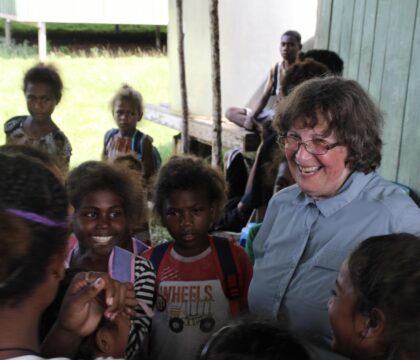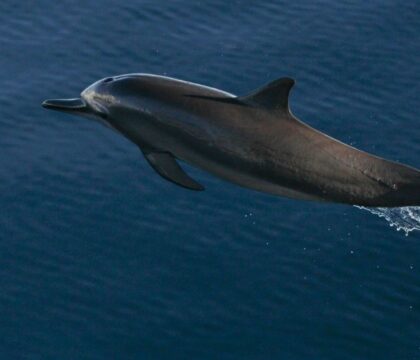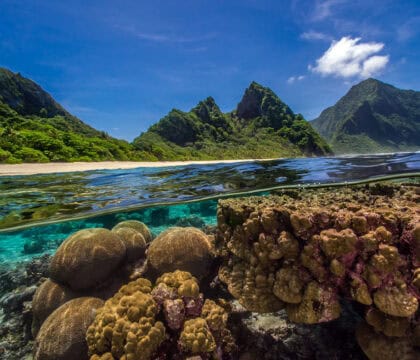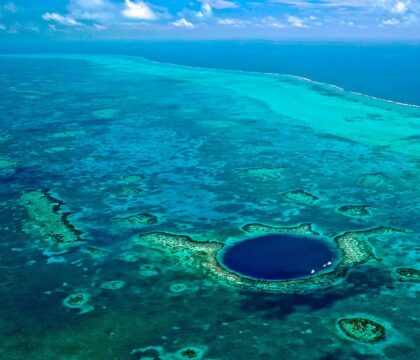April 20, 2022 • Program Updates
On Sunday, March 27 a group of twelve Oceanic Society community members gathered to clean-up a section of Ocean Beach in San Francisco. While Oceanic Society regularly hosts beach clean-ups, this particular event had a specific focus on microplastics—tiny plastic particles (smaller than 5 mm) that currently account for 11% of total plastics in the ocean.

Oceanic Society members gear up for a beach clean-up effort at Ocean Beach in San Francisco. © Carolynn Box
Microplastic Pollution: A Growing Problem
Although they are just one facet of the ocean plastic pollution problem, microplastics have become a growing cause for concern in recent years. They have now been found in nearly every marine environment, from the deep sea to coral reefs and coastlines, even in remote Antarctic ice. More recently, microplastics have been found in human blood for the first time, showing that the particles are able to travel throughout the body where they have the potential to lodge in our organs and damage human cells. While the overall impact of microplastics on human health is still unknown, their impact on the environment is better documented. From infiltrating and disrupting marine food systems, to inhibiting growth, development, and reproduction, or causing toxicity effects and longer-term genetic damage, the impact of microplastics on ocean health far outweighs their tiny size.

One piece out of hundreds of microplastic items that were collected during Oceanic Society’s clean-up effort. Microplastics are defined as tiny plastic particles (smaller than 5 mm) © Carolynn Box
An Educational Clean-up Effort
Bringing increased awareness to the plastic pollution crisis, especially through hands on experiences, can be a powerful tool for motivating action. And coming together with fellow community members to participate in a beach clean-up is not only a way to make a tangible difference, it also helps inspire us to continue to fight plastic pollution at home.
Led by microplastic pollution expert Carolynn Box, our volunteer clean-up group on March 27 used specialized sieves to sift through sections of sand to examine and collect small debris. In total, they collected hundreds of microplastic particles, as well as more than 35 pounds of larger trash pieces along the shore during the course of the morning. With Carolynn’s guidance, they examined the microplastic particles and discussed their possible sources as well as ways to prevent microplastic pollution.

Specialized sieves are used to sift sand and collect tiny plastic particles. © Carolynn Box
Positive Strides to Combat Microplastic Pollution
Plastic pollution is an overwhelming challenge for ocean health, made even more difficult with the complexity and small size of microplastics. However, a growing number of efforts are working to turn the tide on this pervasive problem.
Last month, California became the first U.S. state to put in action a plan to combat microplastics, committing $3 million this year and targets that span until 2030. This comes on the heels of the UN announcing its efforts to develop a legally-binding UN plastic treaty to tackle the explosive growth of plastic pollution and address the full cycle of plastics from production to disposal.
Fight Microplastic Pollution at Home
In addition to large-scale governmental efforts, more and more people are taking actions into their own hands to fight microplastic pollution. There are a number of steps you can take at home to help reduce microplastic pollution, including:
- Buy a microplastic filter for your washing machine such as Filtrol, Guppybab, or Cora Ball;
- Refuse synthetic clothing purchases (read the tags to avoid polyester, nylon, and Lycra, which are top contributors);
- Refuse personal care products that contain microplastics (e.g. microbeads).
Join the millions of people taking action for ocean health every day by making a pledge to reduce microplastic pollution. For more ideas, challenge yourself with our 7-Day Fight Plastic Waste challenge and explore our extensive tips and solutions for everyday ocean-friendly living.
Want More Inspiration?
Watch this video from a past Oceanic Society beach clean-up to see how fellow community members are getting involved in ocean solutions. In it, you can also see the specialized microplastic sieves in action.





